Got the opportunity to relax with the family this week at the lake. Can’t help but be inspired by the change of scenery as you drive from the Pacific coastline inland towards the Sierras.
If you haven’t had a chance to get to the Sculpture IS: 2015 exhibit at Sierra Azul Gardens in Watsonville, you can check out a sneak peek of my Bone Series Installation here on the website. View the portfolio…
The show is up until October 31st, so make sure to get out there and check out all the amazing work in the garden. Also, click the link to read the Santa Cruz Sentinel article about the show. Enjoy!
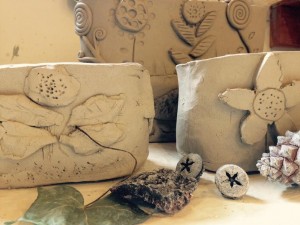 We’re in full swing of week two of our summer sculpting workshops at the studio. We started off the week with clay succulent containers that have texture and pattern decorating the outside. We also made balance bowls, students were challenged to create a bowl that did not touch the table with a flat bottom, this has yielded some interesting results! Next up, we’ll be casting our arms in tape to create figurative sculptures with a focus on form, working with wire to create creeping spiders and painting our clay projects. Its going to be a busy week at the studio!
We’re in full swing of week two of our summer sculpting workshops at the studio. We started off the week with clay succulent containers that have texture and pattern decorating the outside. We also made balance bowls, students were challenged to create a bowl that did not touch the table with a flat bottom, this has yielded some interesting results! Next up, we’ll be casting our arms in tape to create figurative sculptures with a focus on form, working with wire to create creeping spiders and painting our clay projects. Its going to be a busy week at the studio!
A few spots are still available if you’d like to join in on the fun: Sign Up for Summer Workshops Today!
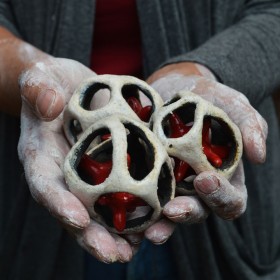
Small sculptures can make a big impact on a space. These little nest pieces are hand held in size, they feel good to pick up and hold, like a found shell or stone. They are inspired by forms in nature, each piece hopes to find the place where art and nature meet. The nests are all handmade and have a small ceramic form fused on the inside that is protected by its outer ceramic shell. A variety of these unique small nests are available in the shop.
 Got some press today in the Santa Cruz Sentinel for my Bone Series at Sierra Azul’s Sculpture IS: 2015 exhibit! Such an amazing line up of artists in this exhibit, I’m so proud to be showing my work alongside them. The show is up until October, make sure that you get out there to see it!
Got some press today in the Santa Cruz Sentinel for my Bone Series at Sierra Azul’s Sculpture IS: 2015 exhibit! Such an amazing line up of artists in this exhibit, I’m so proud to be showing my work alongside them. The show is up until October, make sure that you get out there to see it!
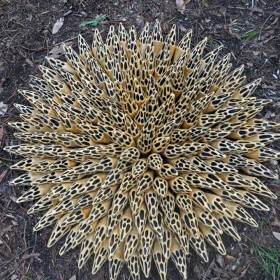 So excited to announce that my Hive Series Installation was accepted at the 7th annual ArtPrize event in Grand Rapids, Michigan and my work will be shown at the Calvin College‘s (106) Gallery in downtown Grand Rapids!
So excited to announce that my Hive Series Installation was accepted at the 7th annual ArtPrize event in Grand Rapids, Michigan and my work will be shown at the Calvin College‘s (106) Gallery in downtown Grand Rapids!
This year ArtPrize runs from September 23 – October 11 and offers artists the opportunity to win more than $500,000 in awarded prizes. Half is decided by public vote and half decided by a jury of art experts. You might of seen the 2014 grand prize winner going viral on social media: Anila Quayyum Agha’s Intersections.
So if you’re in the Grand Rapids area, get out and rock the vote!
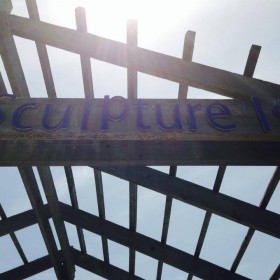 I’m so excited to once again be participating in the Sculpture IS exhibit at Sierra Azul Gardens this summer. It’s one of my favorite local exhibits and it incorporates art and nature beautifully. This year I’ll be doing a site specific installation of my Bone Series. If you were able to make it to the Spring Studio Sale a few weeks ago, you saw a mock up if the installation in the studio, I’m hoping that the garden and sky space will only enhance what is already so exciting about this installation. Hope to see you at the reception!
I’m so excited to once again be participating in the Sculpture IS exhibit at Sierra Azul Gardens this summer. It’s one of my favorite local exhibits and it incorporates art and nature beautifully. This year I’ll be doing a site specific installation of my Bone Series. If you were able to make it to the Spring Studio Sale a few weeks ago, you saw a mock up if the installation in the studio, I’m hoping that the garden and sky space will only enhance what is already so exciting about this installation. Hope to see you at the reception!
Sierra Azul Gardens
2660 East Lake Ave Watsonville CA
Exhibition dates June 1 – Oct 31
Artists reception June 11, 5 – 7 pm
For more information contact: Pajaro Valley Arts Council Gallery
Four of my favorite Haitians were in town this past week, it had been a year since we’d been together and it was so great to see them all! We checked out local arts, cruised the cliffs and made Haitian spaghetti (think hot dogs, ketchup, habanero and pickled herring in spaghetti and generally it’s eaten for breakfast in Haiti!). Thank you to Kathy Barbro for making so much of this possible! And yes, those are creepy baby-doll Voudou sculptures and painted Barbies on the table. Mwen Renmen Ayiti!
To learn more about my projects in Haiti or the artists of Atis Rezistans, click the links
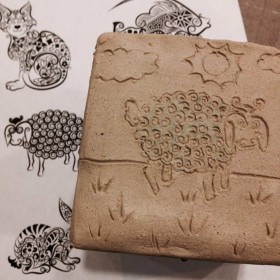 Summer Sculpting Workshops launched this Monday at the studio with fun clay projects and new techniques. Students ages 7 and up made pinch pot pools for their coil built flamingos and we used an ink transfer technique to get cute animal images onto our slab built boxes. While our clay projects dry and get ready for the kiln, we’ll be busy working with paper mache, wire, weaving projects and more!
Summer Sculpting Workshops launched this Monday at the studio with fun clay projects and new techniques. Students ages 7 and up made pinch pot pools for their coil built flamingos and we used an ink transfer technique to get cute animal images onto our slab built boxes. While our clay projects dry and get ready for the kiln, we’ll be busy working with paper mache, wire, weaving projects and more!
A few spaces are still available for young creative artists…
Join Summer Sculpting Workshops for Kids
B CR8IV!!!